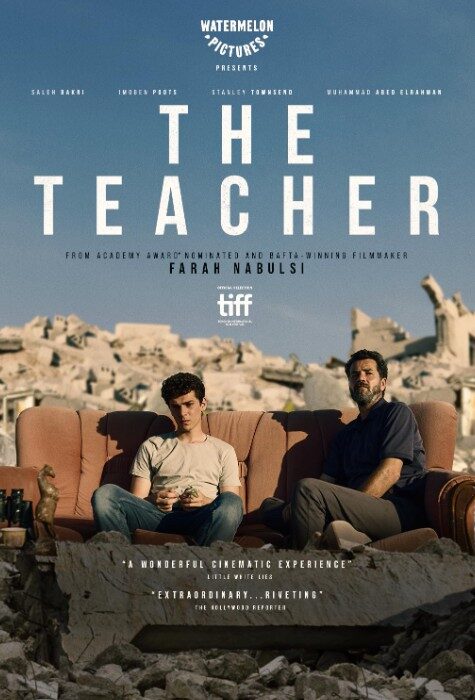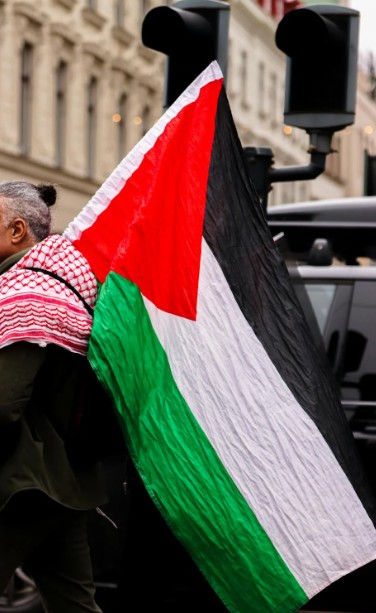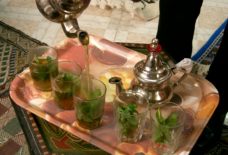The Teacher: An Exploration of Palestinian Survival

By Rena Elhessen/Arab America Contributing Writer
Palestinian representation has arrived on the big screen, thanks to Watermelon Pictures. Palestinian-British filmmaker Farah Nabulsi’s debut film, The Teacher, is out in theaters, and to say it is a must-watch is an understatement.
Farah Nabulsi is known for her short films, highlighting Palestinian stories of survival. The most outstanding being The Present, which won the Audience Award for Best Film. This short film won over 60 International Film Festival Jury and Audience Awards, a BAFTA, and an Oscar nomination. Nabulsi’s The Teacher continues to represent Palestinian resistance, but adds layers of complexity to understanding the conflict of the region.
Though The Teacher is not an easy watch, it is necessary to see. The film is beautifully done, exploring the plight of humanity in the occupied West Bank. It shows the internalized struggle of anger and grief, touching on the intergenerational trauma carried through Palestinian families. In the spirit of education, audiences should watch this film for a greater world view of justice and the value of humanity.
The Teacher
The film is set and filmed in the West Bank and follows the story of a Palestinian teacher of English, Basem (Saleh Bakri). Among his students are brothers Yacoub (Mahmoud Bakri) and Adam (Muhammad Abed Elrahman). Basem becomes a father figure to Yacoub and Adam, guiding the brothers through their anger and despair amidst the ongoing Israeli occupation.
From the beginning, the film immerses audiences in the reality of Palestinian lives under occupation. The constantly developing plot lines of the film represents the chaos Palestinians face when trying to lead normal lives. The opening scene embodies this idea, asking why young Palestinian students should participate in school, given the obvious threat to living a life of normalcy in the occupied West Bank.
Palestinian Resilience

As a student in Basem’s (Saleh Bakri) class, Yacoub (Mahmoud Bakri) struggles to regain a hold on his studies. He struggles to reacclimate to a life of ‘normalcy’ after serving two years in prison. The subtext indicates the conditions of this protest as a rebellion against Israeli presence in the West Bank.
Basem hopes to guide these brothers away from physical acts of anger towards the Israeli presence. Taking a more passive form of protest, Basem argues that their education is a marker of resistance and endurance. Unfortunately, Israeli settlers continue to antagonize the brothers for living as Palestinians in the West Bank, with the seizing and destruction of their house by IDF soldiers, and the burning of their olive groves. The immersion of this film into everyday Palestinian life in the West Bank allows audiences to empathize and develop an understanding of the injustices Palestinians endure.
When Yacoub is killed defending their olive grove, his brother, Adam, is consumed by grief. Basem encourages the family to take legal action. However, the complexities of his character see his abandonment of a peaceful rebellion.
Intergenerational Trauma
The film explores the effects of intergenerational trauma and grief through teased snippets of Basem’s life. As the story continues to unfold, Basem’s past is revealed as he grows closer to Lisa (Imogen Poots), a British volunteer who works at the Palestinian school.
In snippets of his past, it is revealed that Basem’s son had been sentenced to prison due to engaging in a protest at his father’s encouragement. The grief and anger from this sentencing cause Basem’s wife to leave him, blaming him for the collapse of their family. Basem’s internalized anger towards the occupation drove his son to partake in a physical rebellion, leading to his imprisonment, and we see Basem shouldering the blame.
As a result, Basem tries to guide Adam from pursuing vengeance, encouraging him to take the high route of justice. Ironically, Basem does the opposite, continuing to let the anger and grief of his past dictate his actions.
Shared Humanity
Amidst this unfurling tragedy, a subplot of the storyline is introduced. Israeli investigators are searching for an American-Israeli IDF soldier taken hostage in the West Bank. The parents of this captured soldier arrive in Tel Aviv, awaiting the resolution of hostage negotiations. In exchange for the IDF soldier, the captives are arguing for the release of 1,000 Palestinian prisoners.
These plotlines are interwoven when the captive IDF soldier is held in Basem’s home. In one of the most compelling scenes, the American father of the IDF soldier visits Basem at the Palestinian school. The father of the taken soldier appeals to Basem not as an American or an Israeli. He declines the label of Israeli and appeals to Basem as a father. In a showing of the outreach of humanity, Basem sympathizes with him as a father who has also lost his son. By looking beyond the labels of identity, Basem gives the father a glimpse of hope.
Nabulsi claims to have written this subplot based on the abduction of Gilad Shalit, a former Israeli soldier held captive for over five years in Palestine. The resolution of this hostage negotiation resulted in a hostage deal that freed 1,027 Palestinian prisoners.
The Devaluation of Palestinian Lives
This brief instance of humanity is overshadowed by the devaluation of life. Basem tells the father of the captive IDF soldier that his son’s life is worth 1,000 Palestinian lives. In this heartbreaking comparison, the audience is confronted by the truth of life as a Palestinian in occupied territory. The devaluation of humanity is brought on by labels of ethnic origin.
This film was shot before the attacks of Oct. 7, 2023, yet the plotline closely reflects current events in the region. As Israel’s war on Gaza continues, and crime in the West Bank increases, The Teacher emerges as a source of education and understanding of Palestinian survival.
Want more articles like this? Sign up for our e-newsletter!
Check out our blog here!








